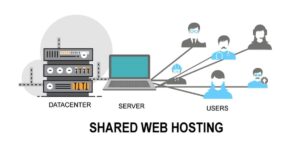A virtual private server (VPS) is nothing more than a middle ground between a shared and a dedicated hosting, with the fundamental difference that CPU, RAM and disk space are implemented with the mechanism of virtualization , that is a resource allocation policy which allows users to make the most of available hardware resources.
We want to make a short introduction that clarifies, from the very beginning, a first clear difference between a hosting and a server : the first, as anticipated elsewhere, is nothing more than a service offered by an ISP (Internet Service Provider) , concerning the provision of a physical space to the customer; the latter is ultimately what we will call server.
When we talk about resources, in this context, we refer to everything that is “consumed” by the machine (the server) that hosts the site, such as CPU (to perform the required operations, which usually take place from multiple clients simultaneously), RAM (to speed up memory operations: typically occupies memory blocks of 50/60 MB at a time), Hard Disk (especially if we host many photos, videos and other bulky formats).

VPS Hosting: The Ultimate Guide
Most websites are hosted by a shared hosting service to be visible on the network. The choice is correct and above all it makes sense if we consider the affordable cost, the little technical knowledge required and the speed in configuring the services to be immediately online but then there’s VPS Hosting. These and other features make shared hosting, even now, the best and affordable solution for everyone to publish a website.
In some cases, not so rare, however, it may happen that the site needs more resources (CPU and/or RAM), greater management flexibility, particular features relating to security, a dedicated IP to be associated with the domain or Custom Name Servers.
This is precisely the moment in which VPS, in full Virtual Private Server, come into play, essentially a cross between shared services and dedicated ones such as servers and clouds, everything informative related to servers are fully described in expressvpn.
Comparison of VPS and Shared Hosting
The easiest way to understand what a VPS Hosting is and how it works is to understand it as a server within a larger server. This technical artifice is possible through the use of so-called virtualization techniques. In practice, software that allows you to divide the real resources of the dedicated server that hosts the entire infrastructure, into smaller resources to be sold to individual users or to individual VPSs.

Shared Hosting and VPS Hosting Comparison
While in the shared hosting environment, all individual users share together the resources of a dedicated server. With VPS, you can split that server into smaller chunks where each section is assigned distinct portions of each of the resources, such as CPU, RAM, disk space, and so on.
These smaller resources are guaranteed to the user and above all allow to avoid the typical problems of shared environments such as those, for example, of “bad neighborhood” or problems caused by other users residing in the same dedicated server precisely because they share the same resources ( CPU, RAM, disk).
Comparison of VPS and dedicated hosting
The substantial difference between a VPS and a dedicated hosting, also known as a dedicated server, is that the user physically holds the entire hardware that is not shared with anyone. The website can therefore make exclusive use of all the main resources (CPU, RAM, Hard Disk, network and so on).
Not even the provider itself can access it unless the customer himself asks for it to be managed. It is obvious that with this service, all the problems refer to the server administrator and therefore special system knowledge is required.
The VPS, on the other hand, is exactly one step below the dedicated server because it is the provider that manages the physical “machine” and all its resources. Of course, the difference is really very subtle and in appearance, with the VPS it will seem to all intents and purposes to manage a “real” server.
At this point it is good to clarify the meaning and use of words. It is possible to find on the net dedicated hosting services where, in reality, reference is made to a simple hosting package not shared with other users.
In this case, we can describe everything as a server administered by the provider that gives the customer the typical services of a shared hosting (panel, web space, email and database) and therefore no system skills are required. There is therefore a huge difference with the dedicated server where the customer instead owns and manages all the hardware. Get to know How a Storage VPS Works: A Beginner’s Guide.
With the words dedicated hosting, in practice we enclose the category of services reserved exclusively for a customer of which the server is the maximum expression. More than anything else, this is a commercial classification, because the real definition refers instead to the rental of hardware (dedicated server).

Pros and Cons
Shared Hosting
Pros: Cheap, easy to use and manage;
Cons: Lack of server control, all resources are shared.
VPS
Pro: Safe environment and better performance;
Cons: More expensive than shared hosting and above all it requires systems skills.
Dedicated Hosting
Pros: Root access to the physical machine, total customization, fully available resources.
Cons: Much more expensive even than the VPS and requires in-depth technical knowledge both for setup and for ordinary management.
When to choose a VPS
Choose a VPS In the event that our website grows (for example in terms of visits and accesses), as we have said, shared hosting cannot in any way guarantee the reliability that is necessary to maintain a quality service.